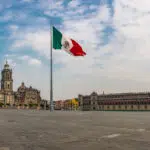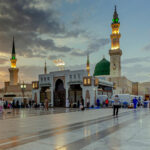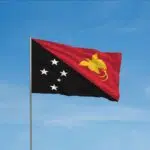Milad an-Nabi, also known as Mawlid, is celebrated by Muslims as the birthday of the Prophet Muhammad. Even though the Muslim religion doesn’t usually celebrate birthdays, as there’s no evidence of the Prophet doing so, the accepted birthdate of the Prophet himself started being celebrated early in Islam’s history and is accepted as a national holiday in many Muslim countries today.
History of Milad an-Nabi (Mawlid)
Derived from the Arabic for “to give birth,” Mawlid now refers to the Prophet’s birthday as well as the text recited at the day’s celebrations. Although Muhammad’s birthday is disputed, many Muslims honor this holiday.
Celebrated in most Muslim countries and others with large Muslim populations like India, Milad an-Nabi honors the Prophet Muhammad’s birthday. This holiday falls in the third month of the Islamic calendar and has its possible origins in the 8th century.
The celebrations of Milad an-Nabi became more popular during the 11th century and it was first celebrated as an official festival in Egypt. During this period, only Shia Muslim, who were the ruling tribe in the region could celebrate the festival and the festivities were not extended to the general public. During the 12th century, countries other than Egypt such as Syria, Morocco, Turkey and Spain, started celebrating Milad an-Nabi. And soon, Sunni Muslims too started celebrating the day.
The festival was performed much differently in ancient times in comparison to modern times. As it was first started in the 11th century in Egypt by the leading clan, they played an important role in the celebration. People started their day by offering prayers. After this, people from the ruling clan gave speeches and verses from the Holy Quran were recited. The festivities would come together with a large public feast. Over the years, practices were modified with a heavy influence of some Sufi practices like animal sacrifices, public discourses and torchlight processions during nightfall.
Mawlid is celebrated in different ways by Muslims in different places. In Pakistan, the holiday highlights national pride with the raising of the flag and ceremonies at national monuments. In other places, the holiday takes on a more festive, carnival-like atmosphere. Some Muslims choose to exchange gifts or give to the poor, and flock to mosques for prayer. Unlike other holidays that are celebrated in the home, Mawlid brings Muslims together in a public display of respect and celebration of the Prophet.
Milad an-Nabi (Mawlid) timeline
It is believed the Prophet Muhammad was born in Mecca on the 12th day of Rabee-ul-Awwal in 570 C.E.
Muhammad's army overtakes Mecca without violence once the resident Quraysh realize they're outnumbered.
The Prophet dies in Medina without naming a successor.
Muslims in countries including Egypt, Syria, Turkey, Morocco, and Spain start celebrating Mawlid as a holiday.
Milad an-Nabi (Mawlid) FAQs
What is Mawlid in Islam?
Mawlid, also mawlūd or mīlād, in Islam, the birthday of a holy figure, especially the birthday of the Prophet Muhammad.The birthday of Prophet Muhammad, also known as Mawlid, is celebrated across the world. In more conservative countries like Saudi Arabia and Qatar, the practice is forbidden as there is no record of the Prophet observing the day.
Why is Mawlid celebrated?
The Mawlid al-Nabawi is the celebration of the birth of Prophet Muhammad. Even though the Mawlid as we know it was not around during the time of the Prophet, Muslim scholars have agreed on its permissibility under the Sharia, or Islamic law, for many centuries.
Can we celebrate the Prophet's birthday?
The birthday of Prophet Muhammad, also known as Mawlid, is celebrated across the world. In more conservative countries like Saudi Arabia and Qatar, the practice is forbidden as there is no record of the Prophet observing the day.
How to Celebrate Milad an-Nabi
Attend a service at your mosque
Mawlid reminds us to express gratitude for the Prophet’s teachings and the guidance that religion provides. Visit your mosque to pay your respect and recharge your spirit today.
Learn about Muslim history
If you’re not Muslim or don’t know much about the religion, use this day to educate yourself about the rich history of this ancient religion and culture.
Donate to charity
One of the common ways to honor the Prophet Muhammad on Mawlid is to give to the poor. Celebrate the holiday with a donation to your favorite charity organization.
5 Interesting Facts About Milad An-Nabi
The Prophet was first a shepherd
Born to a noble family, Muhammad lost both parents at a young age and lived with an uncle, working as a shepherd to support himself and his family.
The Prophet married young
When he was 25, the Prophet's wife Khadijah, a businesswoman who was 40 at the time and admired his honest nature, proposed to him. They were married for 25 years until her death.
The Prophet Muhammad loved animals
According to some records, the Prophet cared for dogs and cats and didn't mind praying in their presence when they wandered into the mosque in Medina.
The Prophet encouraged good hygiene
The Prophet encouraged his followers to practice good hygiene and wash their hands frequently, a practice not yet adopted in Europe until well after the Middle Ages.
The Prophet was an early advocate of social equity
When he learned of the corruption happening in Mecca, the Prophet Muhammad pushed for reform and economic justice.
Why Milad an-Nabi is Important
It honors the prophet who created the Muslim religion
The Prophet Muhammad is a crucial figure in the Islamic world because he is widely considered the final Prophet who received Allah's revelations. Mawlid honors his birthday and acknowledges his contributions to the religion.
It brings us together with our community
Mawlid celebrations include prayer meetings, parades, and communal meals, making it a wonderful time to connect with friends and neighbors.
It emphasizes the importance of the Prophet's teachings
Rather than glorify an individual, Mawlid actually highlights the importance of the Qur'an's teachings and engaging in charitable works for our community.
Milad an-Nabi (Mawlid) dates
| Year | Date | Day |
|---|---|---|
| 2021 | October 19 | Tuesday |
| 2022 | October 8 | Saturday |
| 2023 | September 29 | Friday |
| 2024 | September 16 | Monday |
| 2025 | September 5 | Friday |

































